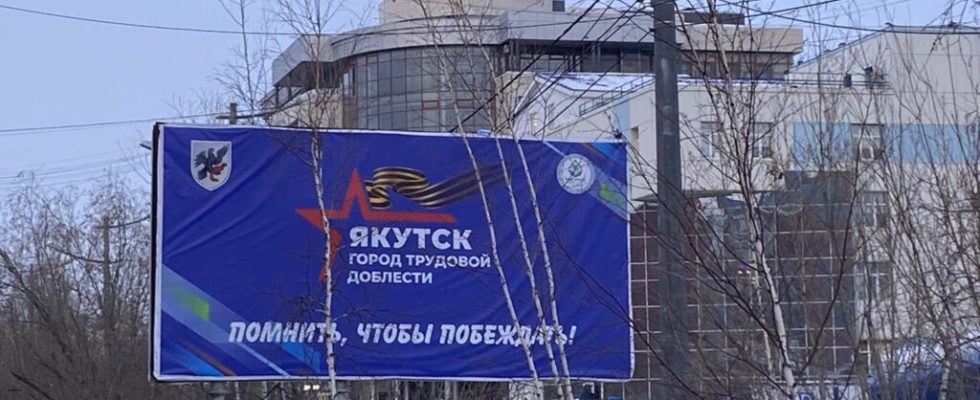All major opposition figures in Russia have fled or are behind bars. Far from the eyes and the media, the repression against dissenting voices or the press, even cautious, is now increasingly affecting the province and the net continues to tighten.
From our special correspondent in Yakutsk,
As soon as you leave the airport, a huge poster in the colors of the Russian flag welcomes visitors. ” All together with the president, for Russia », is it written in capital letters. Welcome to Yakutsk, capital of Yakutia, in Northern Siberia.
On the buildings, clinging to the trunks of snow-covered trees, one can still read ” The army and the people are united ” Or “ Yakutsk in support of victory “. Initiative of the local authorities, these patriotic panels are everywhere. The conflict in Ukraine, nearly 8,000 km away, is very concrete for the inhabitants. According to local observers, each has a neighbor, friend, co-worker or family member sent there to fight.
In the sights of the authorities
“ Many men from the northern part of the region were mobilized last fall. There, there is no human rights organization, no lawyers », explains Anatoly Nogovitsyn, leader of the local branch of the Yabloko party. ” Even mobile phones work very badly, because in many small villages there is no proper network. Local authorities have used this situation, and widespread ignorance of the law, to enlist fathers of families with five to six children, for example. Many were mobilized when they should not have been, because they were told that if they challenged any decision, if they refused to leave, they would necessarily go to prison. »
It was precisely, he says, because he protested against this type of method for partial mobilization in a video posted on social networks that Anatoly Nogovitsyn was sentenced to a huge fine: 200,000 rubles, nearly 3,000 euros, for “ discredit of the army “. Stubborn, this activist appealed and still intends to stand in the local elections in September. This slender thirty-year-old is however very seriously in the sights of the authorities, to the point that they made him pass – something unprecedented in Russia – a psychiatric expertise with some very political issues.
” I think the investigators wanted to use this exam to pressure me, get a confession or something. “, he explains, seated in a cafe in the city where he gave us an appointment. ” Besides that, they asked me during this exam what was the purpose of the party I belong to. I answered what is written in the statutes: “to come to power through the ballot box” ; but they twisted my words and wrote what I said “take power”. At least they didn’t write that I was planning to do it with violence otherwise I had another criminal investigation open against me”. An accusation not to be taken lightly: for this reason, the Russian penal code provides for up to 20 years in prison.
A problematic formula
Timofey Efremov also had trouble with the police after the mobilization. This local journalist was denounced via email for having used the formula “front line”. ” In the media and official statements, we must use the term “contact line” », explains this local journalist. ” For what ? Because what is being carried out is not a military operation, but a special operation. So according to the judge, if I used the word “forehead”, that means that I implied that there was a war and therefore that I discredit the army. It’s totally absurd. »
Now even more cautious in his expression, Timofey Efremov judges in any case the population of the region divided on the sending of Russian soldiers to Ukraine. According to him, one part supports with great enthusiasm, the other has doubts that it prefers to remain silent. On the other hand, a concern is shared, he says: the slow deterioration of living conditions. Still, not everyone in Yakutia makes the connection between the conflict, the sanctions, and some of their consequences such as rising prices, far from it, explains the journalist.
According to the consensus of experts in Russia, Vladimir Putin still has the economic means for his “special operation” for three to four years.
